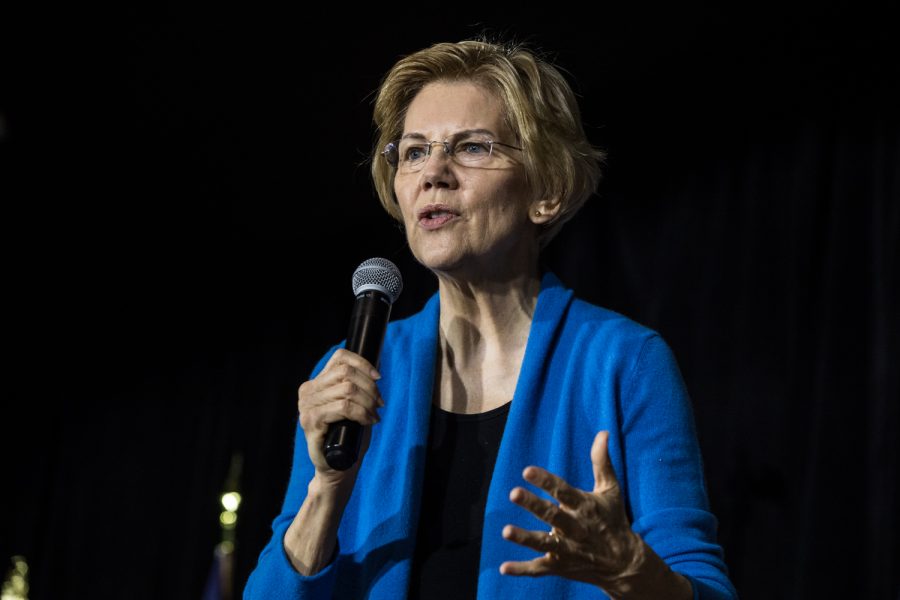Members of Iowa’s ag sector disagree with 2020 candidate Elizabeth Warren’s policy
Democratic presidential candidate Elizabeth Warren proposed a policy at the Heartland forum last week that would break apart corporate farms and agribusinesses. Members of Iowa’s agriculture sector say these policies won’t fix what’s currently wrong in agriculture.
Sen. Elizabeth Warren, D-Mass., speaks during a campaign rally in Cedar Rapids on Sunday, Feb. 10, 2019.
April 3, 2019
After Democratic presidential-nomination candidate Sen. Elizabeth Warren proposed a policy at the Heartland forum last week that would break apart corporate farms and agribusinesses, members of Iowa’s agriculture sector say her policies don’t completely touch on what is currently wrong in agriculture.
Warren’s plan would end contract farming, address farm consolidation, and break down agribusiness that are vertically integrated — meaning a company owns the supply chains and can control numerous areas of a market.
Warren also said her plan would level the playing field for small family farms.
Lindsay Greiner, the president of the Iowa Soybean Association, said he has a lot of reservations regarding Warren’s plan. Most corporate farms started out small, he said, and the markets can work for anybody if small farmers can find their niches.
“There are people who are making a good living on small farms,” he said. “I really see them growing … people will buy what they like to buy, and if that’s from a small produce farmer, then that’s where they’re going to buy their food.”
Greiner said his association represents members whose farm sizes range from the 250 minimum bushels of soybeans to larger corporate farms.
While he liked to see a Democrat talking about agriculture, he said, a bigger issue in the sector is the ongoing trade disputes with China and Mexico. Warren’s plan would put regulations on markets, and the best thing to do is to leave markets alone because “markets take care of themselves,” he avered.
“We need good trade deals because the U.S. is really the bread basket of the world,” Greiner said. “We need export markets.”
The soybean market has been on a decline over the last several years, and China imposed retaliatory tariffs on U.S. agricultural products last summer, which has reduced foreign markets for soybean farmers.
Mark Stutsman, the chief operating officer of Eldon C. Stutsman Inc., an equipment supplier in eastern Iowa, said that if there’s agriculture monopolization, it’s on the meatpacking side rather than the farmers’ end, because of how vertically integrated the meatpacking industry is.
Contract farming, which Warren said she wants to end, gives young people an opportunity to start farming with less production risk, he said. As farms continue to grow in size, he said, it’s “sadly going to be devastating to rural Iowa” because fewer people will be able to populate the region.
“I just don’t know what policy would even come close to reversing that, unless you want to put a ban on all new technology,” Stutsman said, referring to new technology as being responsible for farmers farming more land at a time. “We want to continue to enjoy new products and new technologies to be made available to us. I just don’t see any other options.”
Warren, a Democratic U.S. senator from Massachusetts, has campaigned largely on going after big-tech companies such as Amazon and Google for monopolizing the technology industry and not paying their fair share in taxes.
Sen. Joni Ernst, R-Iowa, said in an interview with The Daily Iowan on March 27 that one of her priorities leading up to her re-election run is strengthening agriculture markets in Iowa. She said she would like to see tariffs lifted.
“Trade ties in so much with the ag economy and [making] sure that we [focus] on opening new markets,” Ernst said.
RELATED: 2020 presidential hopeful John Delaney outlines climate change strategy in Iowa City



